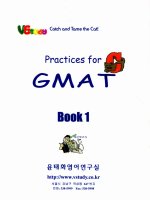4eSample poster 5 evaluation
Bạn đang xem bản rút gọn của tài liệu. Xem và tải ngay bản đầy đủ của tài liệu tại đây (19.67 KB, 2 trang )
Plants on Acid
Swoyer, Julius, Kenner, Sutton
Presented in an introductory course for non-majors at Bucknell University
Layout and Appearance
Criteria
Positive
Negative
APPEARANCE: Is the poster neatly constructed? Do the text and the figures stand
out against the background? Are colors
and fonts used consistently? Is the text
large and legible from 3–6 feet away?
SECTIONS: Does each section begin with
a descriptive heading? Is there sufficient
space between sections? Do the sections
naturally flow from top left to bottom
right?
BALANCE: Is there a nice balance between text and figures? Is there too much
text?
PROOFREADING: Is the text free of typos and grammatical errors?
Poster is neatly
constructed.
Nice use of colored paper for contrast.
Font size is large
and legible.
Each section has
a descriptive heading.
Good use of
space.
Layout flows
from top left to bottom right.
Good balance
between text and
figures.
Content
Reduce amount of text by using
bullets for the main points.
Gibberellic acid and abscisic acid
are common nouns and should not be
capitalized mid-sentence.
Criteria
Positive
Negative
TITLE: Does the title grab your attention?
AUTHORS: Are the authors’ names, affiliations, and contact information provided?
INTRODUCTION: Were the objectives
clearly stated? Do you understand why
this study was done? Did you get enough
background information to understand the
system? Were any abbreviations defined
for the general visitor? Were the hypotheses rational?
METHODS: Were the methods described
clearly and concisely?
RESULTS: Were the graphs easy to understand? Were any graphics distracting?
CONCLUSIONS: Do the conclusions
match the data? Are reasonable ideas put
forth to explain the observed patterns? Is
there a clear connection between the conclusions and the original objectives?
Hypothesis is
clearly stated.
Methods are
clearly described.
There is a clear
connection between
the objectives and
the conclusions.
Potential sources
of error are pointed
out.
Title is catchy, but does not hint at
the results.
For Latin names of organisms,
capitalize the genus (Brassica), make
the species name lower case (rapa),
and italicize both. Use CSE in-text
citation format 1 in the introduction.
In the methods, do not describe
routine procedures like cleaning
quads and mats before use. Each
item in the methods section could be
shortened by eliminating “we” did
this and that.
Include a ruler as a scale bar in the
photos. Add a caption to emphasize
the important results.
Graph format:
Line graphs with only two data
points are a waste of space. Better:
Use a clustered column graph to display the results of the four treatment
groups side-by-side.
1
Council of Science Editors, Style Manual Committee. 2006. Scientific style and format: The CSE manual for authors, editors, and publishers. 7th ed. Reston (VA): The Council. 680 pp.
In the results section, the exact
dates are not needed since the experiment was done in the lab.
Do not make vague statements
like “As our graphs (Figures 1–4)
show;” instead, formulate the result
with the hypothesis in mind. Better:
Rosette plants treated with GA grew
taller than those treated with water.
Wild type plants, on the other hand,
did not grow taller when treated with
GA.”
The conclusions are wordy. The
data for rosettes do not support the
conclusions (the rosettes treated with
GA did grow taller than those treated
with water).
The error analysis suggests that
the researchers did not carry out their
work carefully (“the wrong seeds
may have been [used]”).









